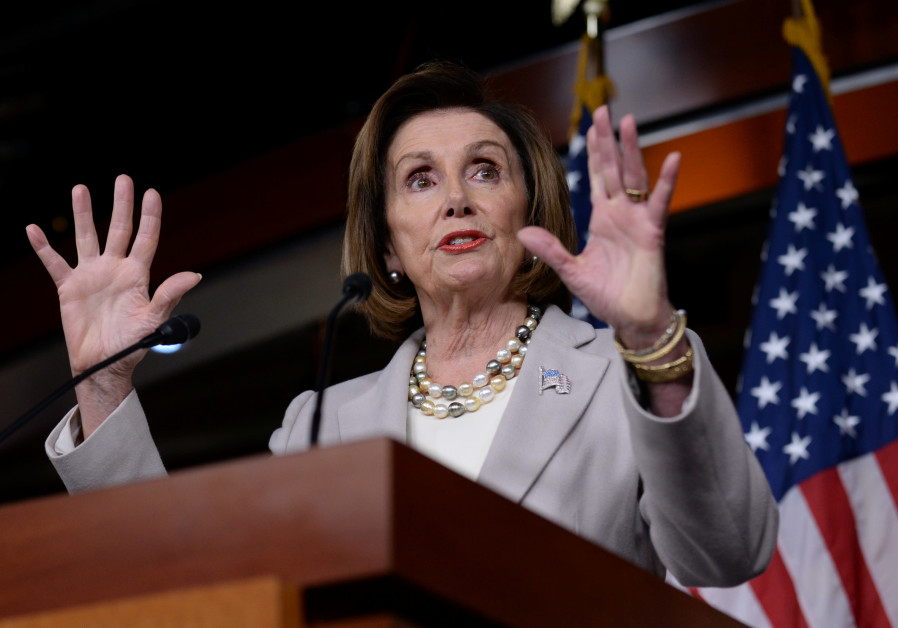At J Street, military assistance to Israel became a campaign issue – analysis

U.S. House Speaker Nancy Pelosi speaks during a news conference on Capitol Hill in Washington, U.S., October 17, 2019. . (photo credit: REUTERS/ERIN SCOTT)
WASHINGTON – J Street’s gala on Monday at the Washington Convention Center attracted dozens of lawmakers, from mainstream Democratic leaders, including from Senate minority leader Chuck Schumer and House Speaker Nancy Pelosi to Rep. Ilhan Omar, who made a brief appearance but refused to take questions from the media.
Outside the convention center’s main hall, a merchandise stand offered items, including a sticker stating, “This Jew is disloyal to bigots,” depicting a caricature of US President Donald Trump.
But the real story of the annual conference of the Jewish Progressive group was not who attended but rather the agenda. One of the main issues was whether a Democrat president should condition aid to Israel as leverage to make it change its settlement policy.
Five presidential hopefuls were interviewed on stage. All of them were asked shortly after the introduction how and if they’d use the $3.8 billion aid as leverage. Some, like Amy Klobuchar of Minnesota and Michael Bennet of Colorado, would not commit how they would act if they were elected.
South Bend, Indiana, Mayor Pete Buttigieg, who was among the first candidates to raise this issue on the campaign trail, made the connection between possible annexation to the conditioning of aid. He likened the US-Israel relations to a relationship with a friend who is “acting in a way that you think might hurt your relationship, might hurt them and might even hurt you,” and offered to “put your arm around your friend, and try to guide them toward a better place.”
“Putting the arm around the friend,” Buttigieg clarified, actually means that the US should use its mechanism “to ensure that US taxpayer does not get turned into support for a move like annexation.”
Sen. Bernie Sanders was more explicit, and said that changes in aid appropriations might come on the first day of his administration. He said that “some of that $3.8 billion should go right now into humanitarian aid in Gaza,” without any conditions on the Israeli policy.
“I would use the leverage of $3.8 billion,” he said. “It is a lot of money… We have a right to demand respect for human rights and democracy.”
Thus, the future military assistance to Israel, anchored in a 2016 memorandum of understanding for 10 years – was put into question and became an issue for debate among Democratic hopefuls.
J Street has welcomed the debate around the military assistance, and issued a statement saying that the organization is “pleased to see the 2020 presidential candidates begin to engage in this important conversation as well.”
“For too long, American taxpayers and lawmakers have been asked to provide military assistance to Israel without questioning whether the material acquired with that aid was being used as a blank check to further Israeli policies and actions that the US opposes, including the entrenchment of the occupation,” J Street added in a press release. “J Street believes that our tax dollars should only be used in accordance with our laws and to further our policies and interests. Saying this does not amount to a call for reducing or conditioning American assistance. It does demand a serious inquiry into the uses to which aid is being put and consideration of what restrictions to its use are appropriate.”
During the three days of the J Street National Conference, many speakers have criticized Trump and Senate Majority Leader Mitch McConnell, arguing that the two are trying to draw a wedge between Israel and the Democratic Party. At the same time, one could wonder if the latest debate was helpful in seeking common grounds, or just deepening the same wedge they wish to fix.
`; document.getElementById(“linkPremium”).innerHTML = cont; (function (v, i){ });





Comments are closed.